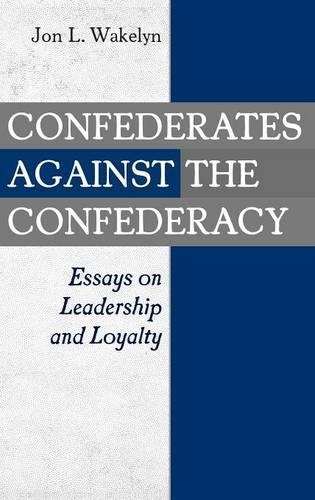
Confederates against the Confederacy: Essays on Leadership and Loyalty
(Hardback)
Publishing Details
Confederates against the Confederacy: Essays on Leadership and Loyalty
By (Author) Jon L. Wakelyn
Bloomsbury Publishing PLC
Praeger Publishers Inc
30th March 2002
United States
Classifications
General
Non Fiction
973.717
Physical Properties
Hardback
208
Description
Far from being a monolith with unanimous leadership loyalty to the cause of a separate nation, the Confederacy was in reality deeply divided over how to achieve independence. Many supposedly loyal leaders, civilian as well as elected officials, opposed governmental policies on the national and state levels, and their actions ultimately influenced non-support for military policies. Congressional differences over arming the slaves and bureaucratic squabbles over how to conduct the war disrupted the government and Cabinet of President Jefferson Davis. Rumors of such irreconcilable differences spread throughout the South, contributing to an overall decline in morale and support for the war effort and causing the Confederacy to come apart from within. When asked to make sacrifices, civilian leaders found themselves caught in the dilemma of either aiding the Confederacy or losing money through poor utilization of slave labor. To sustain profits, the business and planter classes often traded with the enemy. Upon consideration of arming the slaves, many members of Congress proclaimed that the war effort was not worth the demise of slavery and preferred instead to take their chances with the Northern government. Cultural leaders, clergy, newspapermen, and men of letters claimed their loyalty to the war effort, but often criticized government policies in public. By asking for financial support and instituting a military draft, the national government infuriated local patriots who wanted to defend their own states more than they desired to defeat the enemy.
Reviews
[W]akelyn usefully reminds historians about the many divisions within the Confederate leadership, and he correctly reasserts the importance of the connection between slavery and the political decisions made by Southern leaders.-The Journal Of Soouthern History
Wakelyn, the author of several books on the US Civil War, argues that leaders in the slave states disloyal to the cause of the Confederacy were not a monolithic group. The author analyzes the motivations and policies of three groups of dissenting prominent Southern politicians, some of whom served in the Confederate Congress: Southern loyalists to the Union, conditional Successionists, and committed-from-the-beginning Successionists. He also discusses how the Southern Episcopal Church contributed to both the Confederate unity and division.-Reference & Research Book News
Wakelyn's study sheds valuable light on this important group of leaders as well as compels scholars to reconsider the entire political foundation of the Confederacy.-Civil War History
"Wakelyn usefully reminds historians about the many divisions within the Confederate leadership, and he correctly reasserts the importance of the connection between slavery and the political decisions made by Southern leaders."-The Journal Of Soouthern History
"[W]akelyn usefully reminds historians about the many divisions within the Confederate leadership, and he correctly reasserts the importance of the connection between slavery and the political decisions made by Southern leaders."-The Journal Of Soouthern History
"Wakelyn's study sheds valuable light on this important group of leaders as well as compels scholars to reconsider the entire political foundation of the Confederacy."-Civil War History
"Wakelyn, the author of several books on the US Civil War, argues that leaders in the slave states disloyal to the cause of the Confederacy were not a monolithic group. The author analyzes the motivations and policies of three groups of dissenting prominent Southern politicians, some of whom served in the Confederate Congress: Southern loyalists to the Union, conditional Successionists, and committed-from-the-beginning Successionists. He also discusses how the Southern Episcopal Church contributed to both the Confederate unity and division."-Reference & Research Book News
Author Bio
JON L. WAKELYN is Professor of History at Kent State University. He is the author of nine books, including The Politics of a Literary Man, Southern Pamphlets on Secession, Leaders of the American Civil War, and Southern and Unionist Pamphlets and the Civil War.
